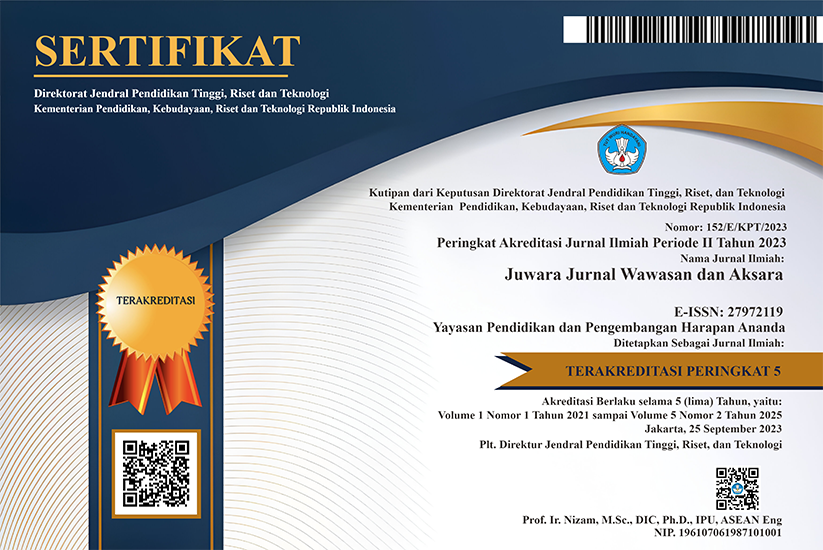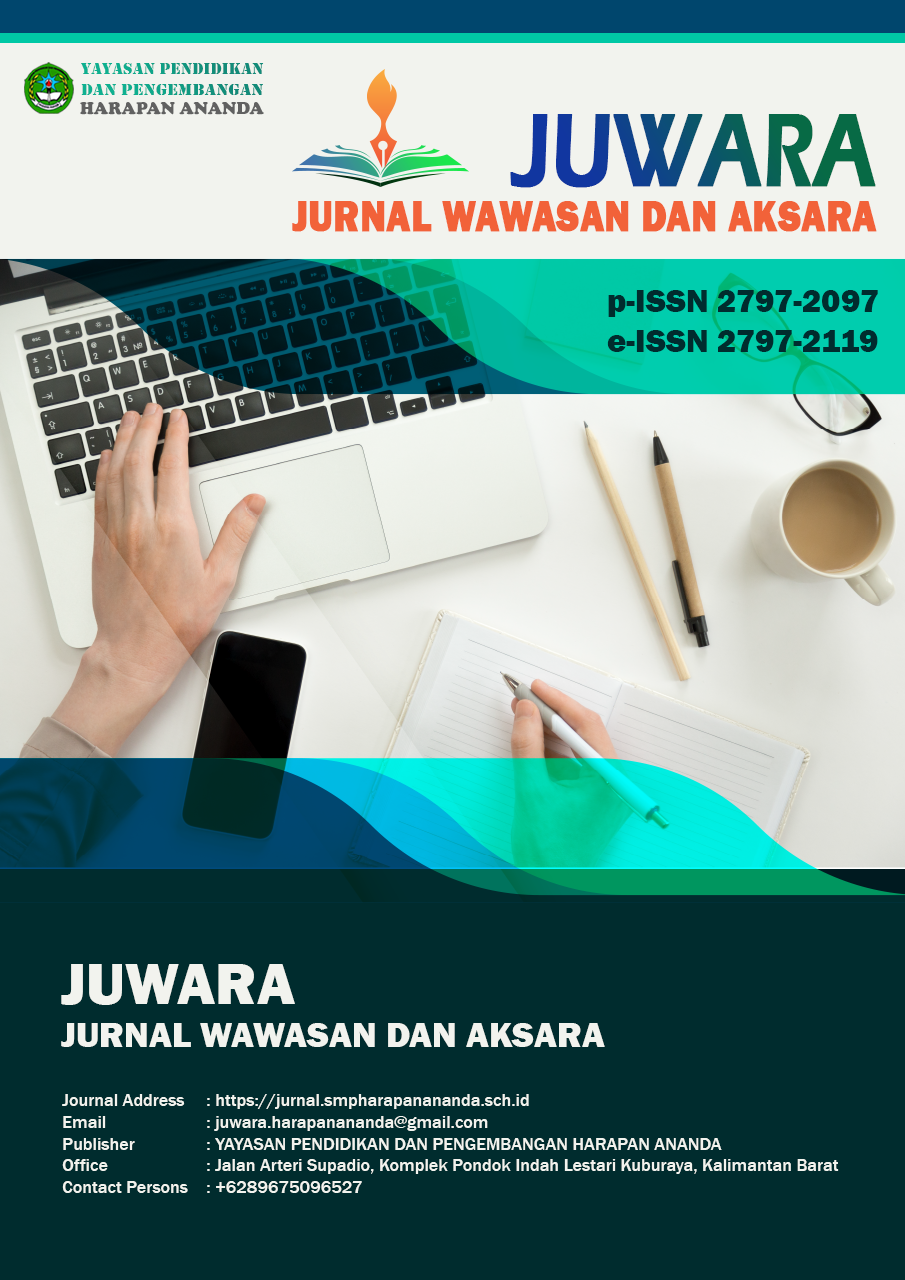Parental Obligation to Provide Religious Education to Children under Islamic Family Law in Indonesia
DOI:
https://doi.org/10.58740/juwara.v5i1.383Keywords:
islamic family law, obligation, religious educationAbstract
This research aims to examine the obligations of parents in providing religious education to children from the perspective of Islamic family law in Indonesia. Religious education is a basic right of children guaranteed by law, as well as the main responsibility of parents as the first and main educators in the family. Through a normative juridical method with a descriptive-analytical approach, this study analyzes various relevant regulations, such as the Compilation of Islamic Law (KHI), Law Number 1 of 1974 concerning Marriage, and Law Number 35 of 2014 concerning Child Protection. The results of the study show that Islamic family law explicitly obliges parents to instill religious education to children as part of the process of shaping children's morals, morals and character from an early age. The implications of the results of this study indicate that the lack of legal awareness and weak implementation of religious education responsibilities by parents can lead to the formation of a young generation that is spiritually weak and prone to deviant behavior. Thus, strengthening the role of the family in children's religious education is an important aspect in creating a generation of faith, piety and noble character.
References
Bahiroh, S. (2024). The Role of Single Parent in Educating Children’s Religion: (Case Study in Sawahan Hamlet). Review of Multidisciplinary Education, Culture and Pedagogy, 3(2), 190–197. https://doi.org/10.55047/romeo.v3i2.1162
Bellous, J. (2021). Spiritual Care as the Foundation for a Child’s Religious Education. Religions. https://doi.org/10.3390/rel12110954
Boen, C., Olson, H., & Lee, H. (2022). Vicarious Exposure to the Criminal Legal System Among Parents and Siblings.. Journal of marriage and the family, 84 5, 1446-1468 . https://doi.org/10.1111/jomf.12842
Cammu, N. (2020). We Are Three Parents, but Legally Two: Absent Legality, Present Display. Journal of Family Issues, 42, 1007 - 1028. https://doi.org/10.1177/0192513X20983379
Departemen Agama RI. (1991). Kompilasi Hukum Islam di Indonesia. Jakarta: Direktorat Jenderal Bimbingan Masyarakat Islam.
Efendi, A., Septiani, C., Syakira, S., Dalvinova, Z., & Wismanto, W. (2024). Analisis Peran Pendidikan Orangtua Dalam Membesarkan Anaknya Berbasis Al-Qur’an dan Sunnah. Jurnal Budi Pekerti Agama Islam, 2(3), 07–19. https://doi.org/10.61132/jbpai.v2i3.291
Harry, M., Saifullah, S., Jundiani, J., & Fajarani, M. (2024). Examining the Provision of Legal and Religious Education to Islamic Families to Safeguard the Rights and Well-Being of Women and Children: A Case Study Conducted in Malang Regency, East Java. Samarah: Jurnal Hukum Keluarga dan Hukum Islam. https://doi.org/10.22373/sjhk.v8i3.19566
Iles-Caven, Y., Bickerstaffe, I., Northstone, K., & Golding, J. (2021). Spiritual and religious beliefs and behaviour: data collected from 27/28-year-old offspring in the Avon Longitudinal Study of Parents and Children, 2019-2020. Wellcome Open Research, 6. https://doi.org/10.12688/wellcomeopenres.17153.1
Iqbal, M., Panjaitan, A. Y., Helvirianti, E., Nurhayati, N., & Ritonga, Q. S. P. (2024). Relevansi pendidikan karakter dalam konteks pendidikan Islam: Membangun generasi berkarakter islami. Indonesian Research Journal on Education, 4(3), 13-22. https://doi.org/10.31004/irje.v4i3.568
Islahuddin, I., Yahya, R., & Besar, Z. (2021). Parenting In Educating Children in Accordance with Sunnah Guidance. Religio Education. https://doi.org/10.17509/re.v1i2.41344
Izzatunnisa, Y., & Mutiawati, M. (2024). Parenting Practices and Religious Character Development in Early Childhood. Ascarya: Journal of Islamic Science, Culture, and Social Studies. https://doi.org/10.53754/iscs.v4i1.674
Jura, D., & Naray, C. (2023). Maximizing the Role of Parents Through Religious Education in the Family in the Scope of Early Childhood Education. AL-ISHLAH: Jurnal Pendidikan. https://doi.org/10.35445/alishlah.v15i4.4508
Kaymakcan, R., & Hendek, A. (2022). European Court of Human Rights’ judgements and compulsory religious education in Turkey. British Journal of Religious Education, 44, 444 - 454. https://doi.org/10.1080/01416200.2022.2045901
Khoiriyah. (2021). Dampak Perceraian Orangtua Terhadap Pendidikan Spiritual Anak di Desa Karduluk Tahun 2020. Tarbawi Ngabar: Jurnal of Education. https://doi.org/10.55380/tarbawi.v2i2.112
Maimunah, A., Sari, D., Choliq, A., Sukatin, S., & Yusup, M. (2022). Shaping Children's Character Through Religious and Family Education. AURELIA: Jurnal Penelitian dan Pengabdian Masyarakat Indonesia. https://doi.org/10.57235/aurelia.v1i2.155
Prucnal-Wójcik, M. (2024). Religious Education of the Child as Part of Parental Duties – Comparative Legal Analysis of National Reports Submitted to the Commission on European Family Law. Multidisciplinary Journal of School Education. https://doi.org/10.35765/mjse.2024.1325.06
Rahila, A. (2024). Prospects of the Role of Parents in Islamic Religious Education in the Contemporary Era. Maklumat: Journal of Da'wah and Islamic Studies. https://doi.org/10.61166/maklumat.v2i4.28
Sari, M., Komsi, D., Yanti, S., & Manora, H. (2023). The Role of Family Education in Improving Religion and Moral Values in Early Childhood. Journal of Childhood Development. https://doi.org/10.25217/jcd.v3i2.3871.
Sinuraya, N., & Rangkuti, M. (2024). Parents' Leadership Patterns in Motivating the Implementation of Islamic Religious Education in Children. Edumaspul: Jurnal Pendidikan. https://doi.org/10.33487/edumaspul.v8i2.8644
Smith, J. (2020). Transmission of Faith in Families: The Influence of Religious Ideology.. Sociology of religion, 82 3, 332-356 . https://doi.org/10.1093/socrel/sraa045
Suganda, R. (2022). Metode Pendekatan Yuridis Dalam Memahami Sistem Penyelesaian Sengketa Ekonomi Syariah. Jurnal Ilmiah Ekonomi Islam, 8(3), 2859–2866. https://doi.org/10.29040/jiei.v8i3.6485
Umar, H., Bafadhal, H., & Darwita, A. (2023). Adopted Children in the Perspective of National Law and Islamic Law in Indonesia. Journal of Social Research. https://doi.org/10.55324/josr.v2i7.1157
Wati, S., Amelia, R., Hidayatina, H., & Gusmirawati, G. (2022). Religious development and child personality: What does religious psychology say about them. Gender Equality: International Journal of Child and Gender Studies. https://doi.org/10.22373/equality.v8i1.12767
Yuliana, R., & Nurjanah, I. (2021). The Role of Parents in Improving Students' Religious Attitudes. Jurnal Paradigma. https://doi.org/10.53961/paradigma.v13i1.80
Yuliani, S., Firmansyah, S., & Prasetya, R. N. (2025). The Influence of Artificial Intelligence in the Resolution of Family Law Disputes: Prospects and Challenges. Journal of Multidiscipline and Collaboration Research, 1(2), 135–140. https://doi.org/10.58740/jmcr.v1i2.370
Zulhaini, Z. (2019). Peranan keluarga dalam menanamkan nilai-nilai pendidikan agama Islam kepada anak. Al-Hikmah (Jurnal Pendidikan dan Pendidikan Agama Islam), 1(1), 1-15. https://doi.org/10.36378/al-hikmah.v1i1.57
Downloads
Published
How to Cite
Issue
Section
License
Copyright (c) 2025 Umi Liwayanti, Muhamad Zainuri, Umi Nurjamilah, Royan Rosyadi

This work is licensed under a Creative Commons Attribution-NonCommercial 4.0 International License.
JUWARA: Jurnal Wawasan dan Aksara provides open access to anyone so that the information and findings in these articles are useful for everyone. This journal's article content can be accessed and downloaded for free, following the creative commons license used.




















